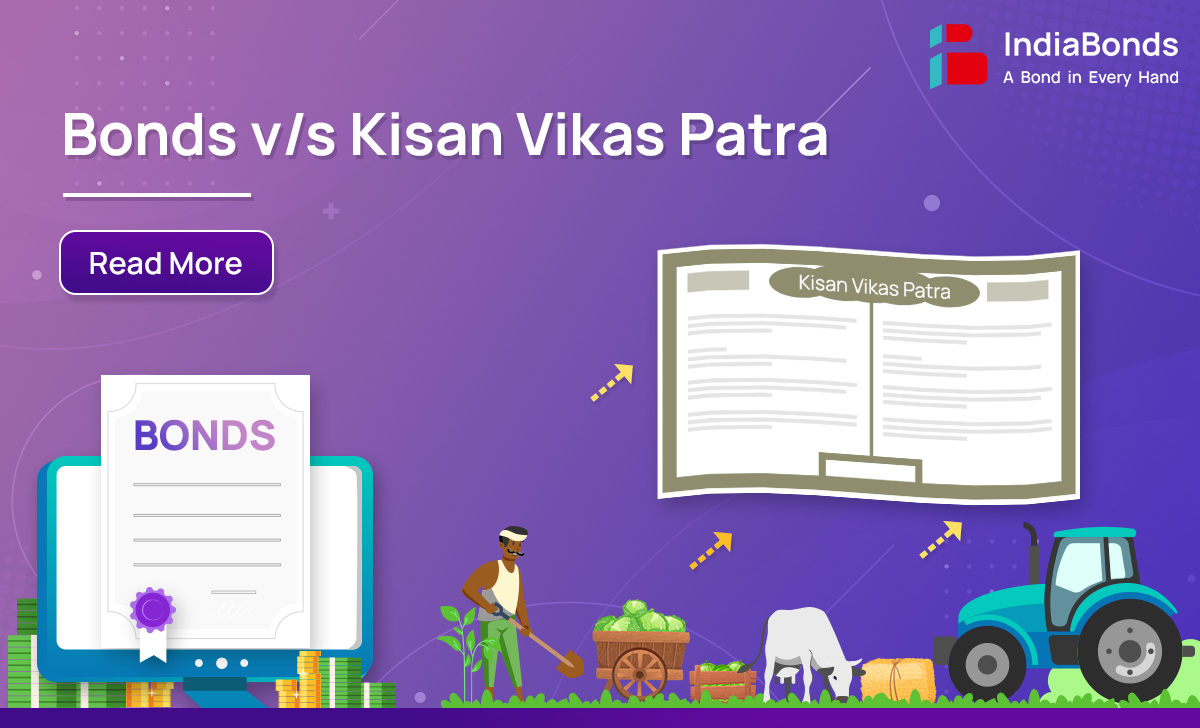Bonds And KVP – Where Should You Invest?

Whenever you think about investments, some of the most common and talked about avenues come to your mind, i.e., stocks, mutual funds, and gold. You might wonder if you have only 2-3 limited investing options. Aren’t there any other instruments that can provide good returns?
Yes, there are! You can never run out of options when it comes to investment avenues. Two prominent investment avenues are Kisan Vikas Patra and bonds. Let’s do Bonds vs KVP analysis to find the more suitable one for you.
What is Kisan Vikas Patra?
Kisan Vikas Patra (KVP) is an investment scheme launched by the Government of India in 1988. Initially, it was a small saving certificate scheme for farmers. However, today, anyone who fulfils the eligibility criteria can invest in Kisan Vikas Patra. Post offices across India issue KVPs. You can invest in these jointly or individually.
In 2014, government relaunched KVP with additional requirements, including the mandatory furnishing of a PAN card for investments above Rs. 50,000 and furnishing income proof for investments above Rs. 10 lakh.
Kisan Vikas Patra Interest Rates
While you understood what is KVP, check out its interest rate. A key benefit of investing in Kisan Vikas Patra is that it offers competitive interest rates vs FDs. Currently, the interest rate on Kisan Vikas Patra is 6.90% p.a. compounded annually.




Features of Kisan Vikas Patra
The Kisan Vikas Patra post office scheme is gaining popularity among investors largely because of the following features:
Government Backed:
This scheme is a Government of India initiative. Any instrument backed by the government is one of the safest to invest in.
Capital Protection:
The Kisan Vikas Patra scheme offers assured returns regardless of market fluctuations. Therefore, it reduces your overall portfolio risk. You get the entire invested capital and the returns at the end of the tenure.
Premature Withdrawal:
While the tenure of the scheme is 124 months, the lock-in period is 30 months, after which premature withdrawal is allowed. However, it is only permitted in case of a court’s order or account holder’s demise.
Interest Rate:
As stated earlier, the interest rate on the Kisan Vikas Patra scheme is 7.2% p.a as on 1st January 2023. Further, the interest is compounded yearly.
Ease & Affordability:
You can invest in Kisan Vikas Patra for as low as Rs. 1000 and multiples thereof. Further, there is no maximum limit.
Term:
The total tenure of this scheme is 124 months or 10 years and 4 months. At maturity, you can withdraw your corpus. Further, the maturity proceeds of KVP will continue to accrue interest till you withdraw the amount.
Loans:
You can avail of a loan by furnishing your Kisan Vikas Patra as collateral security. The interest rates are less than those of other unsecured loans.
Types of Kisan Vikas Patra
The KVP post office scheme comes in three variants:
Single Holder Type Certificate:
Here, the KVP is allotted to an adult. The allotment can be for the adult himself or on behalf of a minor.
Joint A Type:
Here, the Kisan Vikas Patra is issued jointly in the name of two account holders. Upon maturity, both holders will receive the payout from the scheme. In case of the demise of one of the account holders, the survivor will receive the payout.
Joint B Type:
The Kisan Vikas Patra is also issued jointly in the name of two account holders. However, upon maturity, the payout goes only to any one of the account holders or the survivor, as the case may be.
What are Bonds?
Bonds are debt instruments that allow the issuers to raise debt from the bondholders. Many corporates, public sector units, and even the government use bonds to raise capital. The corpus is utilised for business operations, growth and infrastructure projects.
Bonds are debt instruments that carry a coupon rate or interest rate. This interest is paid to you at pre-determined intervals. Further, bonds can be raised for varying tenures and can even be traded in secondary markets.
The following are the categories of bonds that you can invest in:
Government Bonds:
These bonds are directly issued by the government to raise corpus for various nationwide and state projects.
Corporate Bonds:
These bonds are issued by corporate houses to fund their business expenditure and operations.
Bank and Financial Institutions Bonds:
These bonds are issued by banks and financial institutions.
PSU Bonds:
These bonds are issued by public sector undertakings. In these undertakings, the government holds 51% or more shares.
Benefits of Investing in Bonds
Bonds are preferred by investors when it comes to fixed-income securities. It is because of the following benefits they entail:
Fixed Income:
As stated earlier, bonds carry a fixed interest rate that assures fixed income to you. While the interest rate may vary depending on the type of bond you select, most offer interest higher than the inflation rate and bank FDs.
Low Risk:
Bonds carry a lower risk than most other investing avenues. However, you must determine the issuer’s credibility. You can check the credit rating of the issuer to determine the risk that the bonds carry. Further, they are a great avenue for diversifying your portfolio and managing the overall portfolio risk.
Government Backing:
If the bonds are issued by a public sector undertaking or by the Central or State Government, they are secure. These bonds have minimal risk of default.
Liquid:
Most bonds are tradable in the secondary markets. Therefore, they are liquid, and you can easily convert them into cash.
Tax Benefits:
Some bonds are eligible for tax benefits under Income Tax Act, 1961. For instance, you can invest in the bonds of NHAI and RECL and get tax benefits under Section 54EC of the Income Tax Act, 1961. You can claim a maximum exemption of Rs. 50 lakh per year.
Difference Between Bonds and Kisan Vikas Patra
While we discussed bonds and Kisan Vikas Patra, let’s examine the difference between bonds and KVP:
| Parameters | Bonds | Kisan Vikas Patra |
| Tenure | Not all bonds carry a fixed tenure. Further, it depends upon the issuer. | KVPs come with a tenure of 124 months. |
| Government Backing | Only the bonds issued by the government or a PSU are backed by the government. | The government backs all KVPs. |
| Default Risk | It depends upon the issuer of the bond. | KVPs carry minimal to zero default risk because they have government security. |
| Interest Rate | The interest rate on bonds can be 8% – 12% p.a. | Currently, the interest rate on KVP is fixed at 6.90% p.a. |
| Tradability | Bonds are tradable in secondary markets. | KVPs are not tradable in secondary markets. |
| Issuer | The issuer can be corporates, banks, government, PSUs, etc. | The post offices issue KVPs on behalf of the Government of India. |
In a Nutshell
Bonds and Kisan Vikas Patras are gaining momentum among investors. If you are searching for avenues beyond the stock markets and conventional gold and real estate, bonds and KVPs are ideal for you. Further, both these avenues reduce your overall portfolio risk.
Still wondering about Bonds vs Kisan Vikas Patra? If you are looking for a higher interest rate and have a moderate risk appetite, you should go for bond investment and this is now made very easy to select and invest on IndiaBonds platform. . However, if you want to park your funds in the safest avenue possible with a moderate interest rate, you should invest in Kisan Vikas Patra online or through the post office. You can avail current bond offers on IndiaBonds here.
Frequently Asked Questions
1. Whether interest on KVP is exempt from tax?
The interest that you earn on KVP is not exempted under income tax law, it is taxable.
2. Can I transfer your KVP from one post office to another?
Yes. You can transfer KVPs from one post office to another by filing an application in Form-B.
3. What factors affect the value and attractiveness of bonds?
Bonds’ value and worth are primarily affected by 2 factors:
- Market Conditions: Market conditions and interest rates can affect the performance of bonds. Primarily the level of interest rates in economy determine the value of bonds.
- Rating: The credit ratings assigned by the top credit rating agencies like CRISIL, CARE, and ICRA determine the attractiveness of bonds.
Disclaimer: Investments in debt securities/ municipal debt securities/ securitised debt instruments are subject to risks including delay and/ or default in payment. Read all the offer related documents carefully.













































